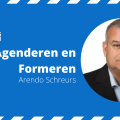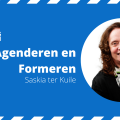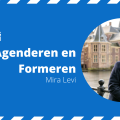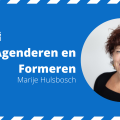In our interview series “Planning and Forming” we speak to experts from various sectors about the issues in their sector, the ways in which they are trying to put them on the agenda in the upcoming coalition agreement and their view of the new House of Representatives. This edition we speak to Illya Soffer.
Illya Soffer is director of Elke(in). This is a national network for people with a disability or chronic condition. An inclusive society is an important topic these days. Everyone is working hard for a society in which everyone can participate and no one is excluded. People with a disability or chronic condition should be given every opportunity to participate fully in society.
What are the important issues for your sector?
With the UN Convention on Disability as a basis, the Elke(in) network represents the interests of more than 2 million people with a disability or chronic illness. Despite the fact that the Netherlands ratified the UN Disability Convention in 2016, we see that people with a chronic illness or disability continue to experience disadvantages in all areas of life: from gaining access to the right care and support, to having the opportunity to find a suitable home. and an adequate income. In order for people with a disability or chronic illness to truly become part of society, we must make that society fully accessible and inclusive in the coming years. The policy is now too fragmented and comes together in pieces in the lives of people with disabilities. We are committed to ensuring that this changes: that there is an integrated approach in the areas that most affect our supporters.
What topics have you addressed in the elections and the new coalition agreement?
Nothing about us, without us. That is our plea for all decision-making. Give people with disabilities and their representative organizations a place at all levels in policy making, and use experiential expertise in a timely and careful manner. We also want to strengthen the social domain. There, the municipality arranges everything regarding care, support, public space and work. We argue for a return to the human dimension and for sufficient resources for municipalities and implementing organizations.
In what ways have you put this into practice?
Together with our members and supporters, we have drawn up an election manifesto. We have shared this with the political parties. In addition, together with many other organizations, we have made an urgent call to strengthen the social domain. By putting an end to the battle between the government and the municipalities over money. Municipalities and implementing organizations must have sufficient resources to carry out their tasks. By allowing people's demand for support to be leading and not focusing on the offer that the healthcare provider or the budget that the municipality has available. By giving people a voice in all policies that affect them.
“It is crucial for these groups in particular that the human touch is restored in the implementation of laws and regulations in the field of care, support and participation.”
What needs to change in the next 4 years?
Something needs to change in how people with disabilities or chronic conditions are thought about when making and implementing policy. People with a disability or chronic illness are not disabled because of their illness or disability, but because of the barriers they encounter when participating in society. The more those barriers are removed, the more accessible society is for everyone and the less separate support and facilities people need. The stories of the victims of the benefits affair are incredibly recognizable for people with a disability or chronic condition. They too often have to struggle, complain or even litigate to receive appropriate support. This is not only evident from the stories we hear, but also from various reports. It is crucial for these groups in particular that the human touch is restored in the implementation of laws and regulations in the field of care, support and participation.
Do you think your sector is well represented in the House of Representatives?
In policy, people's lives are divided into boxes with partitions in between. To make a difference in the life of a person with a disability or chronic illness, as advocates, we must visit dozens of separate departments, departments and directorates, not only in The Hague, but also in every municipality, each with their own director, manager and executors. Impossible. The House could start by more and better connecting all topics that undeniably affect the lives of people with disabilities or chronic conditions. Especially when it comes to topics such as healthcare, education, labor, income, accessibility and housing. Topics that have been placed in the various parliamentary committees from politics and therefore make advocacy more complicated than necessary.
How do you see the future regarding politics in the Netherlands?
We are finally seeing more attention throughout the political playing field for reducing the human scale. More importance is attached to listening to stories from society. The emancipation of people with a disability or chronic condition is in full swing and we notice that there is more focus on accessibility, inclusion and diversity. As Everyone, we will do everything we can to strengthen that movement.





